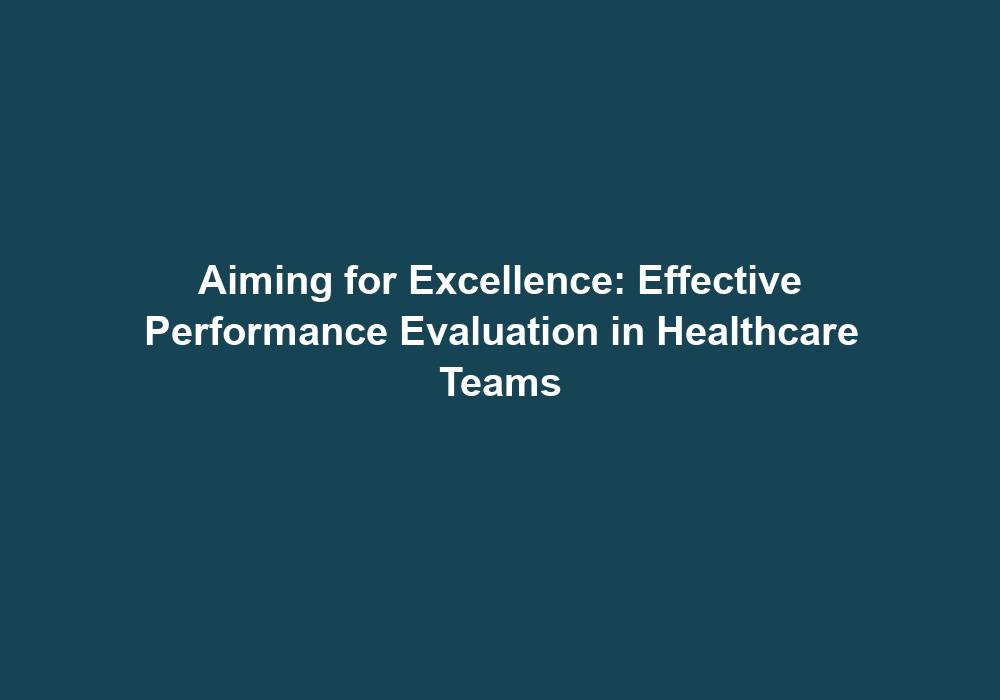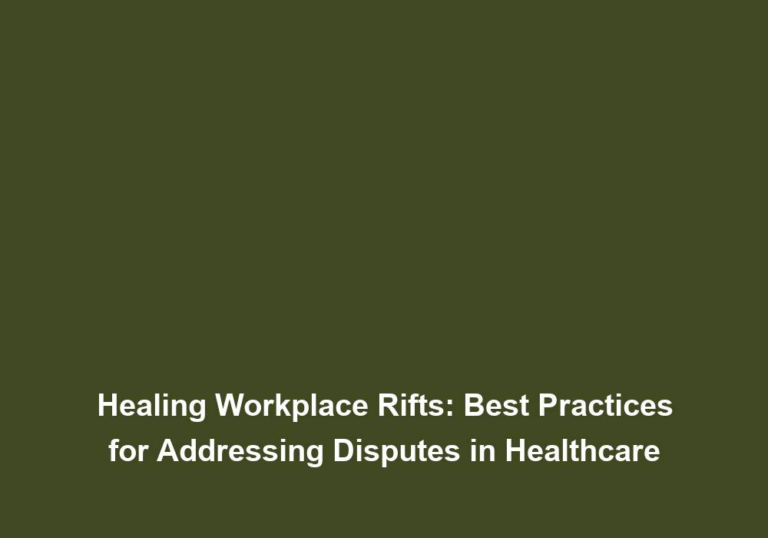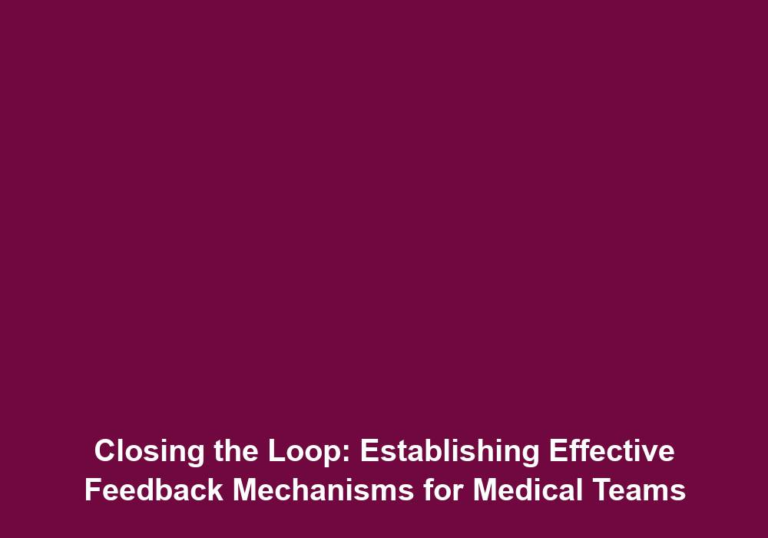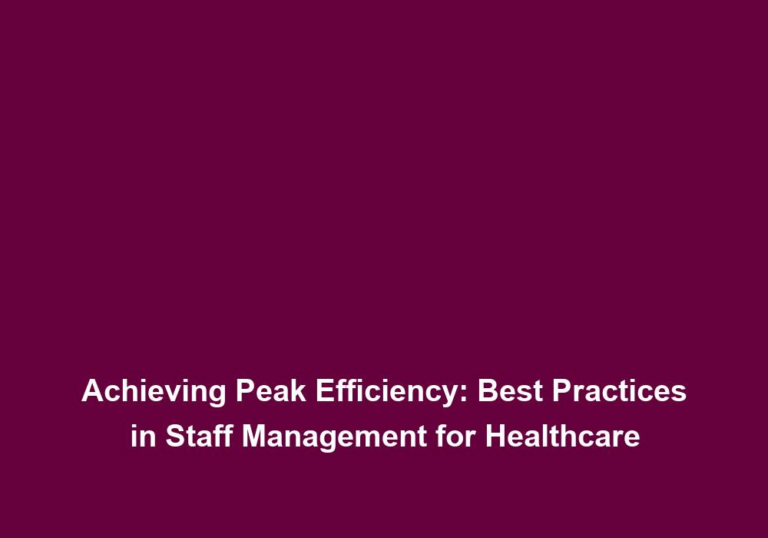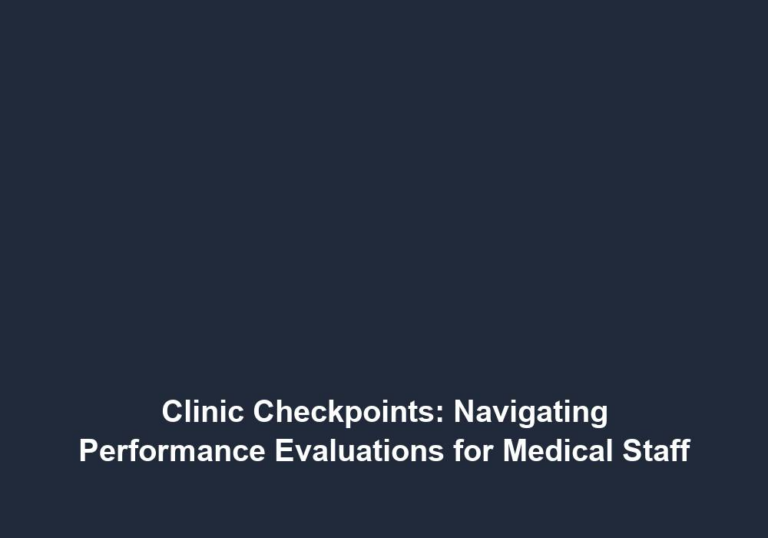Aiming for Excellence: Effective Performance Evaluation in Healthcare Teams
In the fast-paced and demanding field of healthcare, ensuring that healthcare teams are performing at their best is of utmost importance. One way to achieve excellence in healthcare teams is through effective performance evaluation. This process allows healthcare organizations to assess the performance of individual team members, identify areas of improvement, and ultimately enhance the overall quality of patient care.
Why is Performance Evaluation Important in Healthcare Teams?
Performance evaluation plays a crucial role in healthcare teams for several reasons:
-
Identifying Strengths and Weaknesses: Performance evaluations allow healthcare organizations to assess the skills and capabilities of team members. By identifying both strengths and weaknesses, organizations can determine areas where additional training or support may be necessary.
-
Evaluating strengths helps healthcare organizations recognize and utilize the unique talents and abilities of team members. This can lead to the delegation of tasks that align with individuals’ strengths, resulting in improved efficiency and productivity.
-
Identifying weaknesses helps healthcare organizations address areas where team members may need additional support or training. By providing targeted resources and development opportunities, organizations can help team members overcome their weaknesses and enhance their overall performance.
-
-
Providing Feedback: Regular performance evaluations provide an opportunity for team members to receive feedback on their performance. Constructive feedback helps individuals understand their strengths and areas that require improvement, fostering continuous growth and development.
-
Feedback should be specific, actionable, and focused on both positive aspects and areas for improvement. This enables team members to understand their performance in detail and make the necessary adjustments to enhance their skills and abilities.
-
By providing feedback in a timely manner, healthcare organizations can address performance issues promptly, preventing them from escalating and negatively impacting patient care.
-
-
Improving Team Collaboration: Performance evaluations can enhance team collaboration by promoting open communication and transparency. By discussing performance expectations and goals during evaluations, healthcare teams can align their efforts towards a shared vision, leading to improved collaboration and teamwork.
-
During performance evaluations, team members can discuss their roles, responsibilities, and how they contribute to the overall goals of the team. This fosters a sense of shared purpose and encourages collaboration.
-
Evaluations also provide an opportunity for team members to provide input and suggestions for improving teamwork and communication. By addressing any concerns or issues, healthcare organizations can create a supportive and collaborative work environment.
-
-
Enhancing Patient Care: Effective performance evaluations contribute to better patient care outcomes. By focusing on performance improvement, healthcare teams can identify gaps in knowledge or skills and take appropriate steps to address them. This leads to improved patient satisfaction and overall quality of care.
-
Through performance evaluations, healthcare organizations can identify areas where team members may need additional training or resources to improve their ability to deliver high-quality care.
-
Performance evaluations also help healthcare teams identify best practices and areas of excellence that can be shared across the organization, leading to improved patient care standards.
-
Key Elements of Effective Performance Evaluation in Healthcare Teams
To ensure that performance evaluations in healthcare teams are effective, it is essential to consider the following key elements:
1. Clearly Defined Performance Metrics and Goals
Performance evaluations should be based on clear and specific metrics that align with the goals and objectives of the healthcare organization. Metrics can include clinical outcomes, patient satisfaction scores, adherence to protocols, teamwork effectiveness, and individual competencies. Setting measurable goals and performance standards ensures that evaluations provide meaningful insights and drive improvement.
- Clearly defined performance metrics provide a benchmark for evaluating team members’ performance and progress towards organizational goals.
- Setting specific goals helps team members understand what is expected of them and provides a roadmap for improvement.
- Performance metrics and goals should be regularly reviewed and updated to ensure they remain relevant and aligned with the changing needs of the healthcare organization.
2. Regular Evaluation Cycles
Regular evaluation cycles allow for ongoing feedback and continuous improvement. Healthcare organizations should establish a schedule for performance evaluations, whether it be quarterly, biannually, or annually, depending on the nature of the work and the team’s dynamics. Consistent evaluation cycles enable timely recognition of achievements and prompt identification of areas requiring improvement.
- Regular evaluation cycles provide opportunities for team members to receive feedback and make adjustments to their performance throughout the year.
- They also help healthcare organizations track progress and identify trends or patterns in performance over time.
- Evaluation cycles should be communicated clearly to team members, ensuring that they understand when and how evaluations will take place.
3. Balanced Approach: Self-Assessment and Supervisor Evaluation
A balanced approach that includes both self-assessment and supervisor evaluation provides a comprehensive view of an individual’s performance. Self-assessment allows team members to reflect on their own strengths and weaknesses, fostering self-awareness and accountability. Supervisor evaluation provides an external perspective, offering insights into areas that may go unnoticed by the individual themselves. Combining these two approaches ensures a holistic assessment.
- Self-assessment encourages team members to take ownership of their performance and actively participate in their own professional growth.
- Supervisor evaluation provides an objective viewpoint and can offer valuable insights and recommendations for improvement.
- Both self-assessment and supervisor evaluation should be given equal importance and weight in the overall performance evaluation process.
4. Two-Way Feedback and Communication
Performance evaluations should not be one-sided; they should encourage open and honest communication between team members and supervisors. Feedback should be constructive, specific, and actionable, focusing on both areas of improvement and recognition of achievements. Establishing a culture of feedback and communication fosters mutual trust and helps drive positive change within the team.
- Encouraging two-way feedback allows team members to address any concerns or challenges they may be facing and seek support or guidance from supervisors.
- It also creates an environment where team members feel comfortable providing feedback to their supervisors, leading to improved communication and collaboration.
- Feedback should be timely and ongoing, not limited to the formal evaluation process, to ensure that performance is continually monitored and addressed.
5. Professional Development and Support
Performance evaluations should not be solely focused on assessment; they should also serve as a platform for professional growth and development. Healthcare organizations should provide resources and support to help individuals improve their performance. This can include training programs, mentorship opportunities, or access to relevant literature or workshops. Investing in professional development contributes to the long-term success of healthcare teams.
- Professional development opportunities should be tailored to the individual needs and goals identified during the performance evaluation process.
- Healthcare organizations should provide ongoing support and resources to help team members implement the skills and knowledge gained through professional development initiatives.
- By investing in professional development, healthcare organizations demonstrate their commitment to the growth and success of their team members.
Best Practices for Conducting Performance Evaluations in Healthcare Teams
To ensure the effectiveness of performance evaluations in healthcare teams, consider the following best practices:
-
Establish Clear Evaluation Criteria: Clearly define the criteria and metrics that will be used to evaluate performance. This ensures consistency and fairness in the evaluation process.
- Evaluation criteria should be communicated to team members in advance, allowing them to understand the expectations and align their efforts accordingly.
- Clear criteria provide a transparent framework for evaluation and prevent bias or subjective judgments.
-
Encourage Self-Reflection: Promote self-reflection among team members by providing self-assessment forms or questionnaires. This encourages individuals to take ownership of their performance and identify areas for growth.
- Self-reflection allows team members to critically analyze their own performance, strengths, and weaknesses.
- It provides an opportunity for individuals to set personal goals and take responsibility for their professional development.
-
Regular Communication: Encourage ongoing communication between team members and supervisors beyond the formal evaluation process. This allows for timely feedback, addressing concerns, and tracking progress towards goals.
- Regular communication fosters a supportive work environment where team members feel comfortable expressing their thoughts and concerns.
- It provides an opportunity for supervisors to provide guidance and support in real-time, enhancing performance and addressing any issues promptly.
-
Recognize and Reward: Acknowledge and celebrate achievements and outstanding performance. Recognition and rewards can motivate team members to continue striving for excellence.
- Recognition and rewards can take various forms, such as verbal appreciation, certificates, or monetary incentives.
- Celebrating achievements boosts team morale and reinforces positive behaviors and performance.
-
Continuous Improvement: Use performance evaluation results to identify areas for improvement at the individual and team levels. Implement strategies and provide resources to facilitate growth and address any performance gaps.
- Evaluation results should be analyzed to identify trends, patterns, and areas of improvement.
- Healthcare organizations should develop action plans to address identified performance gaps and provide team members with the necessary resources and support for improvement.
-
Training and Development Opportunities: Offer relevant training and development opportunities based on identified performance improvement needs. This enables individuals to enhance their skills and knowledge, leading to improved performance outcomes.
- Training and development programs should be tailored to address specific performance gaps and align with the healthcare organization’s goals.
- Providing opportunities for continuous learning and skill development ensures that team members remain up-to-date with the latest advancements in their field.
Conclusion
Effective performance evaluation in healthcare teams is crucial for achieving excellence in patient care. By implementing clear evaluation criteria, regular evaluation cycles, and fostering open communication, healthcare organizations can identify areas for improvement and support the professional growth of team members. Continuous evaluation and improvement contribute to enhanced collaboration, better patient outcomes, and ultimately, the delivery of high-quality healthcare services.

